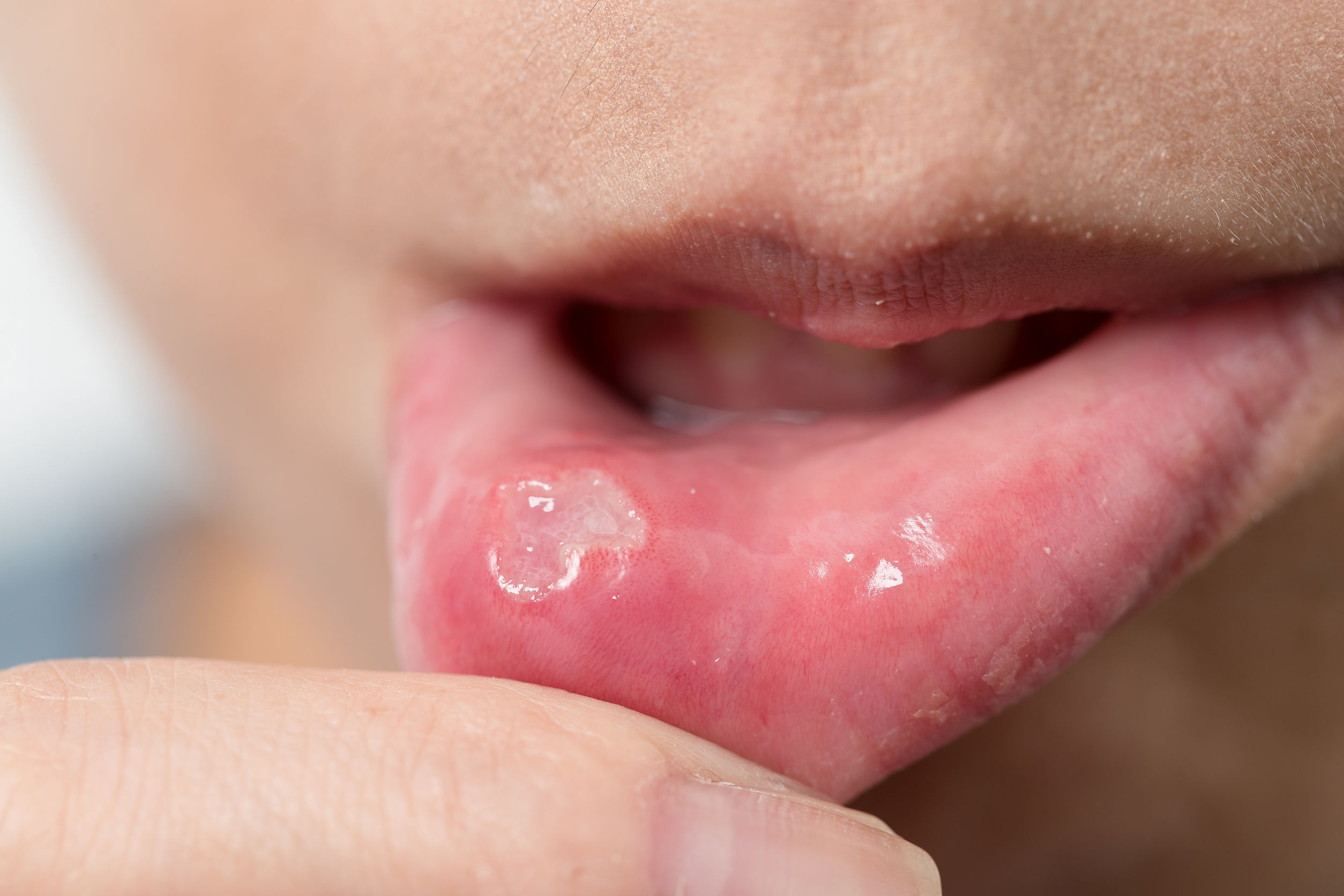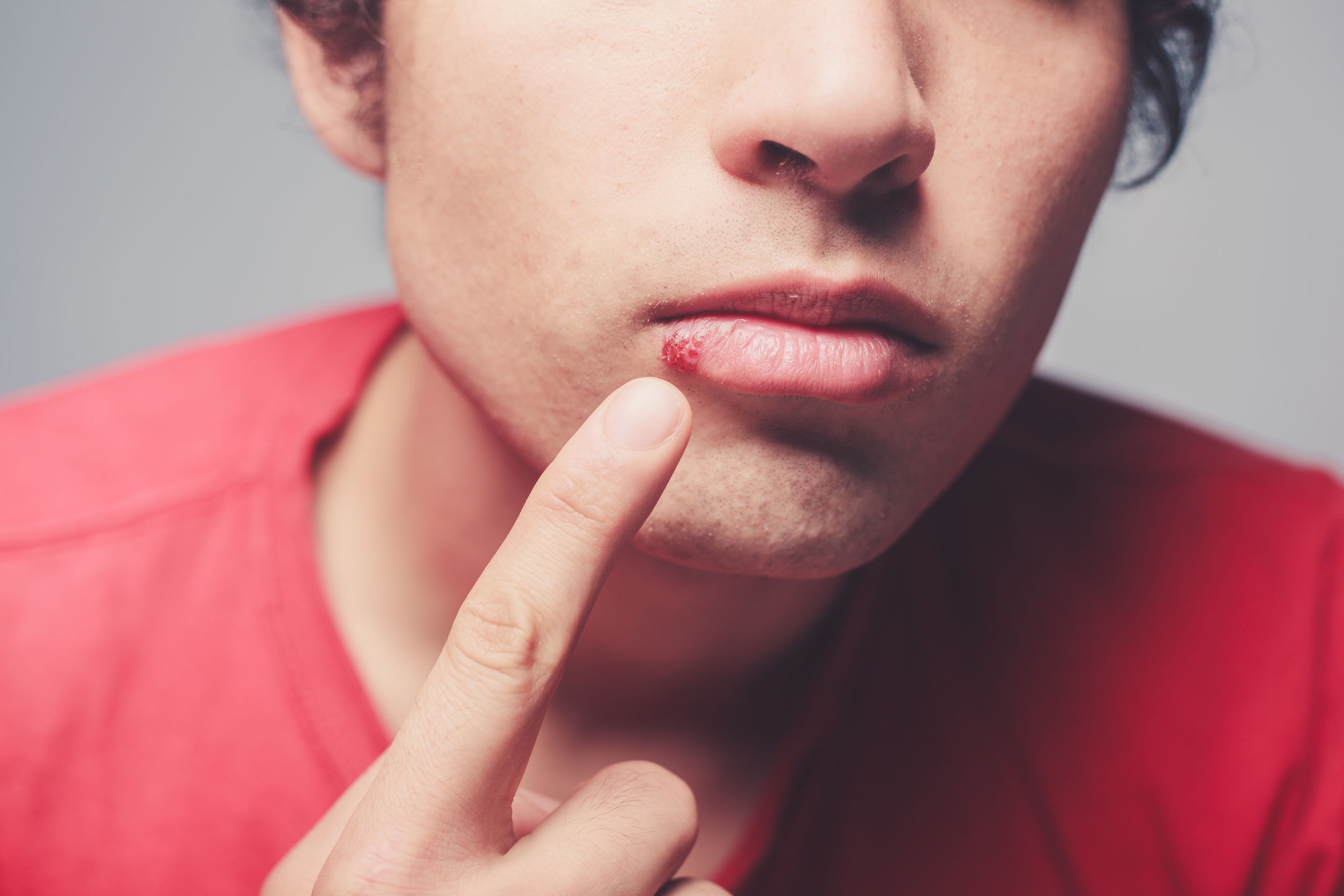Canker sores vs. cold sores, how are they different? And how are canker sores and cold sores affected by gluten?
Many consider both canker sores and cold sores trivial, but these painful eruptions can be a clue that something is amiss.
If they appear frequently, further evaluation for underlying reasons may be warranted. A 2020 study found the incidence of celiac disease to be three times as high as the general population if a child had recurrent canker sores/aphthous ulcers. Let’s dive deeper into these irritating issues.
Canker sores
Canker sores, also known as aphthous ulcers, are round or oval lesions, usually surrounded by redness and mild swelling. They occur on the gums, inside of the cheeks, and under the tongue. They are not seen on the lips and, less commonly, on the tongue itself. There may be one or many at the same time. They typically last seven to ten days. Canker sores are not contagious. They are usually infrequent, occurring once or twice a year. When canker sores arise often, it should be a red flag to you and your practitioner and prompt further evaluation.
The actual cause is not known, but many triggers are identified. Gluten is one of the known triggers.
Canker Sore Causes
Known canker sore triggers:
- Stress
- Food allergies and sensitivities
- Covid
- Hormonal changes
- Vitamin and mineral deficiencies- iron, folate, B12, zinc
- Sodium lauryl sulfate (SLS) found in many kinds of toothpaste.
- Local trauma-such as biting a cheek or rubbing from braces
They also occur more commonly in people with celiac disease, Crohn’s disease, dermatitis herpetiformis, Behcet’s Disease, and gastric reflux disease.
Related Article- Click Here: The Autoimmune Protocol Diet : Does It Help Autoimmune Disease?
Canker Sores and Gluten

Do people with gluten intolerance get canker sores/aphthous ulcers from gluten? There is little research on this, but one study published in September 2015 found that the number of canker sores increased when people with gluten intolerance ate gluten.
Canker sores are more common in people with celiac disease. In one study, five percent of patients with recurrent canker sores had celiac disease. This is five times the rate of celiac disease in the general population. Because of this connection, a person with recurrent canker sores should be tested for celiac disease.
Canker sores are often signs that someone has been exposed to gluten accidentally while maintaining an otherwise gluten-free diet. Could canker sores be a clue to cross-contamination in small amounts? I have not found any studies about a possible correlation-it would be challenging to research, but I frequently hear this from my patients.
Some researchers believe that the oral ulcers occurring with celiac disease differ from those of aphthous stomatitis (canker sores). I would argue that the patient and doctor cannot distinguish this difference clinically and that any patient with recurrent oral ulceration should be evaluated for celiac disease.
Related Post-Click Here: Can Gluten Cause Migraines?
Canker Sore Remedy (Traditional)
Most canker sores resolve on their own in seven to ten days. A more active canker sore remedy may be needed if they are particularly painful or large. Mouth rinses, a topical numbing medicine, vitamins (if deficient), anti-inflammatory medication, or acetaminophen are used to control symptoms. Topical steroids or steroid rinses are given if symptoms are severe.
Canker Sore Remedy ( Alternative)
Choose one or more canker sore remedy that best fits you.
- Stress reduction techniques (meditation, exercise, breathing techniques, etc.),
- Avoidance of food triggers (common ones are tomato, pineapple, citrus, and wheat)
- Adequate sleep-this is essential for a healthy immune system
- Lip balm with sunscreen if sun or wind is triggering.
- A well-balanced, whole-food diet
- Deglycyrrhizinated licorice (DGL) in a pill or mouthwash form
- Myrrh, goldenseal, chamomile, and aloe can be used in teas, pills, tinctures, or mouthwashes*.
- In addition to the therapies listed above, avoiding triggers is crucial to any treatment for canker sores.
- Please use any supplements under the guidance of a healthcare provider.
Related Article- Do Oats Have Gluten?
Cold Sores

A virus causes cold sores (also called fever blisters). Before they start, you may feel tingling in the area before any sores appear. The sores have fluid, like a blister, and eventually break open, forming a crust. They occur on the lips and lip border. They take longer to heal than canker sores – about two to four weeks and are contagious. Once you have a cold sore, it can repeatedly happen throughout your life. Reoccurrences tend to be in the same spot, as the virus “stays asleep” in the nerve until it is triggered. It may be started. Stress or illness are common triggers. If they happen frequently, please seek medical attention.
Cold Sore Triggers

Cold sores derive their name from the fact that they occur more commonly when someone has a cold or illness.
- Cold sores are contagious- touching the sore or kissing can pass them to someone else
- Stress
- Low immunity due to illness, medications, or chronic health conditions
- Prolonged sun and wind exposure
- Hormone fluctuations, such as with the menstrual cycle
- They can be associated with underlying immune disorders so that recurrent episodes may require further evaluation.
Cold Sore Triggers
There is no known direct correlation between gluten and cold sores. However, if someone is chronically ill or stressed from gluten exposure, cold sores may be indirectly triggered by gluten exposure.
Cold Sores Treatment (Traditional)
Most cold sores will resolve with no treatment in two to four weeks. Avoiding close contact with anyone who has a cold sore is the primary means of prevention. Kissing is a common form of transmission. Decrease the risk of passing the virus to others by avoiding touching the blisters. Using sunblock and lip balm may help prevent occurrences for those triggered by the sun and wind. Cool compresses and over-the-counter numbing medicines such as benzocaine are used for pain management. Over-the-counter treatments such as Abreva may be applied topically. Alcohol-based formulas are used to dry out the lesion. Antiviral prescription medications may also be used and shorten the course of symptoms.
Cold Sores Treatment ( Alternative)

- Adequate sleep- 7-8 hours is ideal for most people
- Stress reduction techniques (meditation, exercise, breathing techniques, etc.),
- Lysine-orally or topically
- Consume foods high in lysine-beans, peas, corn
- Rhubarb, sage, or lemon-balm topically
- Probiotics
- Avoid any other triggers specific to you
The Take-Away
Pay attention if you suffer from a canker or cold sores that occur frequently. Note the differences between canker sores vs. cold sores and consider the possible causes mentioned above. If outbreaks persist, seek further evaluation from your healthcare provider. These small eruptions may be easily treatable or signal an underlying disorder that needs further evaluation.





